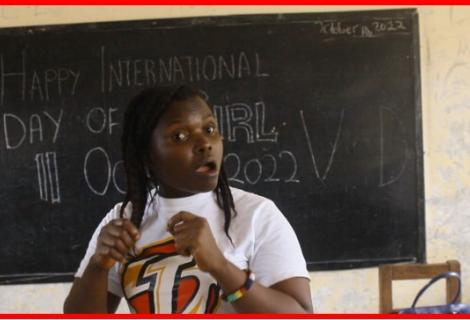YOUNG PEOPLE, THE AGENTS OF ENDING HARMFUL TRADITIONAL PRACTICES

The story of Josephine Poole
As a result of the continued training on sexual reproductive health rights for community-based organizations and local leadership, young people in Gbarma are now talking to their community's traditional practitioners to put the blades down and spare the lives of women and girls for education and a better tomorrow.
The traditional societies in the universe remain secretive within the borders of their members. Outsiders cannot discuss them unless they belong to them. If you are caught discussing the society as a nonmember, then you are likely to face forced initiation or severe punishment resulting in paying a tremendous amount of money.
Many traditional and cultural activities often add value to societies' lives, however; there are other harmful and traditional aspects of traditional and cultural practices which affect justice and equity at the community level.
A decade ago, discussing what happened in the traditional Bush schools (Sande and Poro) was taboo in Liberia. Sometimes, the entire family of a member who spoke about it would be punished, cursed, banished or heavily fined. The penalty usually differed depending on the county or tribe to which one belongs.
In Liberia, female genital mutilation has been a harmful traditional practice affecting the lives and health of women and girls. Their health is usually compromised, and girl children’s conventional educational opportunities are postponed until graduation from the bush school. These are the harmful aspects of the tradition which CBOs under the JEC project are trained to fight against.
The three-year ban on the operation of the Sande Bush schools is an opportunity for young activists like Josephine. She sees this period as a chance to lead her organization in raising more awareness, conducting meetings with local leadership and individual reactionaries. Hence, they understand the significant part of why FGM should be eradicated from other traditional practices.
"I have managed to meet and discuss the effects of FGM with over five Zoes in my community. The light is beginning to shine, and I see that our struggle to end FGM in Liberia is inevitable”, said Josephine.
Josephine and her team continue to engage the traditional practitioners in their community in preparation for JEC project year five activities, which will focus on ending FGM. The one-year pilot project will work exclusively with the traditional practitioners to find common ground where they can establish sustainable and alternative livelihoods drawing on the positive aspects of the traditional schools.
ActionAid Liberia continues its dedication to contribute the technical assistance to community-based organizations (CBOs) like Gbarma. The aim is to enable these organizations to be the driving force behind their progress in providing necessary assistance to the community, especially to women and girls. The organization's support is critical in safeguarding that these communities can access the resources they require to lead healthy and safe lives, and ending violence against women, girls and other vulnerable groups.
